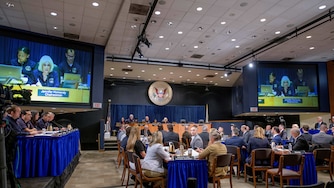The year that Indiana banned “obscene” books from school libraries, Saundra Mitchell fled the state she had known her entire life.
The author, with books banned in 16 states, said she sought refuge in Maryland, thinking its Freedom to Read law would make life a little easier for her and her librarian wife.
But two years into their new life in Anne Arundel County — and six months into the Trump administration — Mitchell is learning her adopted blue state isn’t immune from the culture war against books in schools. One of the latest battles happened in Montgomery County and resulted in a U.S. Supreme Court ruling. Parents across the state, including in Harford County, continue to push for bans.
Many fear that the Supreme Court’s decision in June to allow parents to opt their kids out of lessons involving books with LGBTQIA+ characters will only lead to more challenges against books.
That puts authors like Mitchell in a complicated spot: She can either change the way she writes or prepare for a tougher sell of books on banned lists or those that school officials see as too controversial.
But the 51-year-old, an author and editor of 20 books, has been fighting back — in protests at the Supreme Court in Washington and in the pages of her stories.
“They’re trying to erase whole groups of people from the public eye, because if they can make us disappear, then they can subjugate us,” Mitchell said.
Welcome to Maryland
The Indianapolis native has always enjoyed writing. She wrote short stories in kindergarten, a play in fourth grade and entries for her high school’s literary magazine.
After being kicked out of the Army in the early 1990s for being queer, she started writing scripts for a small production company, the Dreaming Tree. Her dream then was to be a Hollywood writer, but she stayed in Indiana so her young daughter could be near both her parents.
Still, she stuck with writing, eventually specializing in young adult novels.
In 2023, Indiana lawmakers passed a bill that forbade books deemed “obscene” or “harmful to students” in school libraries. That same year, the state banned gender-affirming care for minors.
That was the year Mitchell moved. One of her adult daughters came along, as well as Mitchell’s wife of nearly 30 years, Jayne Walters, whom she met online.
Deciding to leave a place she’s known for 50 years wasn’t easy, but she had had enough of the state’s anti-LGBTQIA+ bills and didn’t want to risk being there during a second Donald Trump presidency.
She learned two states had laws to protect books and rights for transgender people: Maryland and Minnesota. She leaned south for a few reasons — Maryland is more diverse, and one of her favorite shows, “Homicide: Life on the Street,” took place there.
The drivers aren’t great, and neither is the cost of living, she said. But her decision was validated two weeks after the move. Walters, who moved a few weeks before Mitchell, had joined the board of Annapolis Pride. The news was in a local newspaper, with Walters’ picture attached.
A man approached Walters, who is transgender, outside a Pasadena grocery store one day.
“If a stranger is going to come up to talk to my wife, there’s a 50-50 chance in Indiana that’s going to be a very negative interaction,” Mitchell said.
As it turns out, the stranger recognized Walters from the newspaper and was welcoming her to the state.
Annapolis, where Mitchell and her family first moved, was too expensive, and within a year they moved to Glen Burnie. The rent is cheaper, but still more than three times their Indiana mortgage payment.
“People think, ‘Oh, you’re an author. You have so much money,’” Mitchell said. “I don’t have retirement savings because I have been dedicated to writing books about queer characters for the entire length of my career. I don’t get books that they give you tons of money for.”
Straightwashing
Mitchell sold her first book, “Shadowed Summer,” in 2007. It’s the story of a girl who contacts the ghost of a boy who disappeared 25 years earlier. It’s later revealed (SPOILER ALERT!) that the boy died by suicide because he was gay.
“Even that little amount of queerness in my book, my editor tried to cut it all out,” Mitchell said.
People weren’t going to invite her to talk about the book, her editor warned. Scholastic Book Fair, Mitchell said, offered to buy 1,500 copies if she cut out any gay references. Scholastic did not respond to a request for comment.
Her editor accused her of being problematic for refusing to change anything, and Mitchell was later fired by her agent.
(The agent tried getting Mitchell back after “Shadowed Summer” won a book award in 2010, Mitchell said. She wasn’t interested.)
After that, she found the agent she still works with today, and he’s gay. In “Looking for Group,” which she wrote under the pen name Roy Harrison, a gay boy and trans girl go on a cross-country trip to find a legendary Spanish galleon believed buried in California’s Mojave Desert.
The story was special to Mitchell, but the chilling effect of the “Shadowed Summer” drama set in. Fearing her characters’ identities and sexualities would keep the book from selling, she “straightwashed” them — making them straight and cisgender— before handing in her manuscript.
Feeling guilty, she confessed to her agent.
“Look, your job is to write the book that you mean,” she recalled her agent telling her. “My job is to sell it.”
After she returned the characters’ true identities, the book was later listed as one of Teen Vogue’s 10 Best Queer Books.
Being banned
Mitchell said she was “full steam ahead” after that, unapologetically writing stories and characters her way. She has 18 books out now, which include anthologies she has edited, and two more on the way.
She edited a three-book series of anthologies that feature LGBTQIA+ characters and written by LGBTQIA+ authors. The recruited writers, with careers of their own, were happy to participate.
Alex London, a Baltimore native and Philadelphia resident, was one of the writers for “Out There: Into the Queer New Yonder,” the third book in the trio. He wrote a love story about two boys who uploaded their consciousnesses to Mars while their bodies stayed on Earth.
The series sold a decent number of copies. But they landed on lists much different than Teen Vogue’s.
Former Republican Texas state Rep. Matt Krause compiled a list of 850 books that he said “might make students feel discomfort, guilt, anguish, or any other form of psychological distress because of their race or sex,” according to NPR. His list included books about race, puberty and sexuality. Most were written by people of color and LGBTQIA+ writers, reported The Texas Tribune.
Mitchell was one of them.
From then, she noticed other states adopting similar lists and banning books from schools.
After Mitchell moved to Maryland, she learned that Carroll County’s Moms for Liberty chapter had flagged her 2019 book, “All the Things We Do in the Dark,” during the far-right parent group’s campaign to remove “sexually explicit” books from the Carroll’s school libraries.
The book is about a girl who survives rape and was inspired by Mitchell’s own experiences, she said. Parents labeled it as pornography. The book didn’t sell well, she said.
“People think, ‘Oh, it must be fun to get your book banned,’” Mitchell said. “It is not fun. It is humiliating and frustrating, and you feel powerless because there’s only so much that you can do when it happens.”
Editors could fight on their authors’ behalf, but that’s usually reserved for lucrative books, she said, and she’s no Stephen King.
But Mitchell does her own fighting back — whether it’s calling out biased book reviews on social media or joining Glen Burnie’s No Kings rally last month.
She climbed uphill in the heat with a cane to the Supreme Court during the hearings for the Montgomery County case that allowed parents to excuse their elementary kids from classes using storybooks with LGBTQIA+ characters.
The outcome is frustrating to Mitchell who said people often consider books “sexual” when “a queer character exists on the page.”
“There’s a difference between writing about sex and writing about queer people,” she said.
She said she’d understand if “Shadowed Summer” was a book parents kept away from their kids. But instead it was books like “Puppy Pride,” about a family whose dog gets loose during a Pride parade, that were restricted.
Authors fight back
A 2024 study found that two-thirds of Americans oppose book bans in public schools, but such restrictions are on the rise.
London, one of the contributors to Mitchell’s anthologies and the author of over 30 books, said he saw sales for his book, “Proxy,” published in 2013, plummet after it appeared on Krause’s list in Texas.
His requests to speak at schools — something he said he loves doing and earns him extra income — dropped from 20-30 per year to just one.
Another of Mitchell’s anthology contributors, Kalynn Bayron, said that as a mother of four, she doesn’t understand why anyone would want to opt their kids out of “an opportunity to practice empathy, understanding, compassion to people who might not be exactly like you.”
“I think it’s just such a disservice to young readers,” the New York Times Bestselling author said.
Some readers were mad when she created an all-Black cast of characters and an LGBTQIA+ main character in her young adult book, “Cinderella is Dead.” Others thanked her for the representation.
“We come from these marginalized backgrounds, and we’re already taught to kind of make ourselves small,” said Bayron, an Ithaca, New York, resident and writer of a dozen books. “So when we see ourselves at the center of these types of stories, it does something to people.”
It’s why she keeps writing, she said.
Mitchell, who came out in the 1980s, said she feels the same. Back then, sexualities weren’t defined beyond “gay,” marriage equality seemed a lifetime away and she didn’t think queer people would be allowed in the military.
LGBTQIA+ people have been pushed down over the years, the author said, but they have to get back up.
“All of this is dark and hard and frustrating, but there is hope,” said Mitchell. “There is hope in community. There is hope in these books. Just because things are hard doesn’t mean that we can’t get better.”
About the Education Hub
This reporting is part of The Banner’s Education Hub, community-funded journalism that provides parents with resources they need to make decisions about how their children learn. Read more.





Comments
Welcome to The Banner's subscriber-only commenting community. Please review our community guidelines.